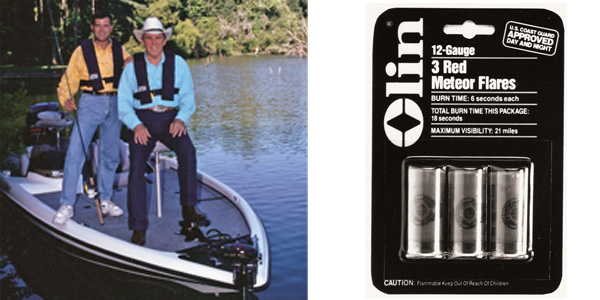
BOAT SMART
IT’S A NEW BOATING SEASON
CHECK EVERYTHING CAREFULLY
Capt. Fred Davis
It seems like only yesterday we were covering our boats, winterizing, cleaning and preparing them for storage – where has the time gone? Now it’s time to get them ready once again for the boating season.
I do most of my summer boating on Lake Huron, in the tip of the Thumb of Michigan. Our area is generally slow to start the boating season and many boats don’t hit the water until after Memorial Day. As late starters one would think there was enough time to do all the spring preparations but that is just not the case. Boaters rush through spring tasks to get their crafts in the water. They do the obvious chores but fail to perform some important items.
Flares are often overlooked and they are a Coast Guard required safety item. Your flares and other pyrotechnic signaling devices are dated and if they are not checked it could be an expensive oversight. Before launch, check to make sure you have every required item subject to inspection on board and in good working order. The Coast Guard no longer sits waiting for a call for help, or AAA job (tow). They are now a vital part of Homeland Security and are frequently on patrol stopping and inspecting vessels underway - BE PREPARED.
Among items that go unnoticed are worn belts. They can present a nightmare for boaters with inboard or I/O engines. A worn belt can be a major problem if it is not detected. When checking your belts, look for a set in the belt. If the tension on the belt was not relieved during storage, you likely have a hard set where the belt has taken shape to a pulley. When you start your engine, the set in the belt may start to thump or cause a vibration. To avoid a breakdown at sea you should carefully check all belts and properly adjust them.
Another task often overlooked is greasing the zerk fittings and bearings. Most boats from big cruisers to small outboards have a need for grease. During storage, grease on engine parts dries and hardens so much you cannot pump grease into the fittings. DO NOT just skip that fitting and go on to the next. Remove it and soak in a thinner or grease removing solvent. Better yet, replace it. This action could save you from a poor experience or expensive repair.
While greasing your engine parts and checking belts, take a few more minutes and check your wiring. Make sure splices are solid and wiring is properly supported. Poor splices or loose, vibrating wires can short out and blow a fuse. They may even cause a fire. While checking your wiring – do you have extra fuses? Be sure they are the right size because fuses can be hard to obtain when you’re out to sea.
Another missed spring start-up chore is proper checking of water pump impellers. They also can take a set and when started the rubber veins break off causing the engine to overheat. I observe this problem frequently. A normal cause of worn impellers is just neglect to check your engine by running it prior to launch.
Many boaters start their engines by hooking up to a hose for a water supply and running them prior to putting the boat in the water. Pressure in the hose can give a false appearance of water pumping.
Drain plugs are often overlooked when checking your boat in the spring. If they were removed for storage, just installing the plugs may not be good enough. You should carefully inspect the female part of the plug assembly to be certain it is secure, not cracked or loose. Check the plug by backing off the tension and checking to be sure the center pin inside the rubber is not deteriorated.Some manufacturers are using a poor grade of material that degrades and comes apart, usually while the boat is unattended at dockside. I have seen boats sink from this problem.
Remember when you head out for your first boating venture of the spring, do not be too proud to put your lifejacket on – it can save your life. Boating accident statistics indicate the number of lives lost at sea by those not wearing a PFD has increased from 80 to 90%. THEY DON’T WORK IF YOU DON’T WEAR THEM!
Return to Home Page of Tipsforboating.com